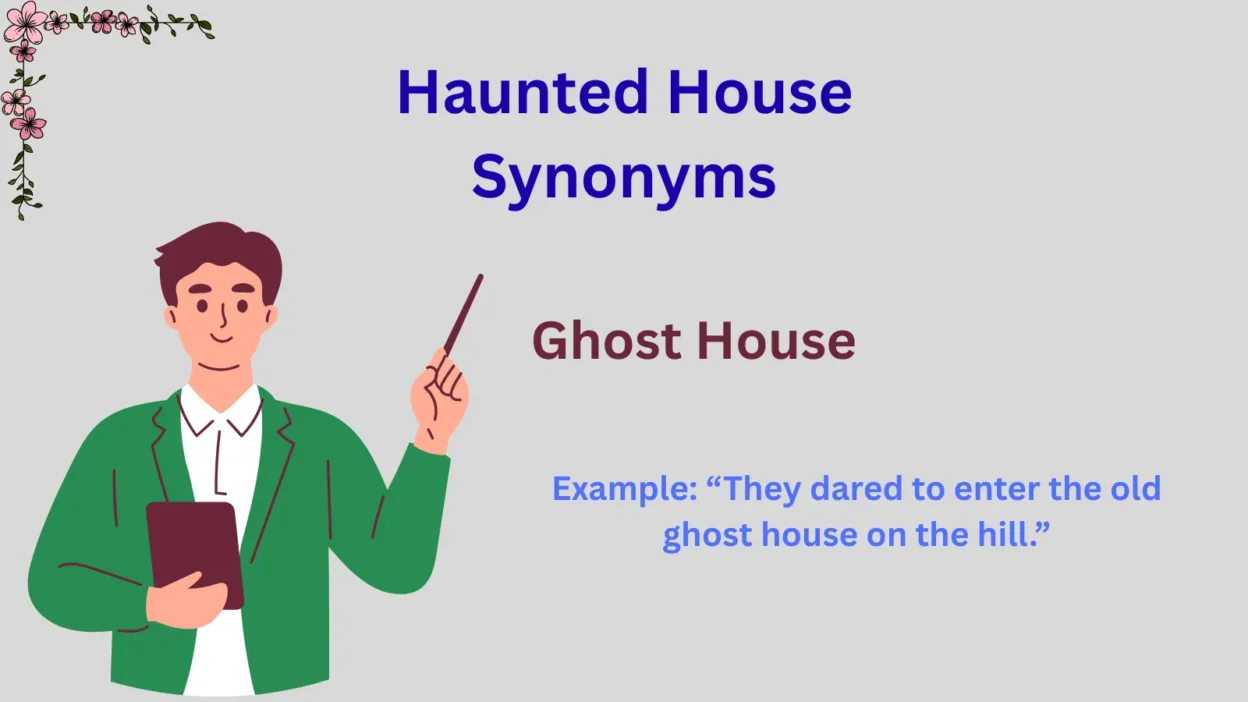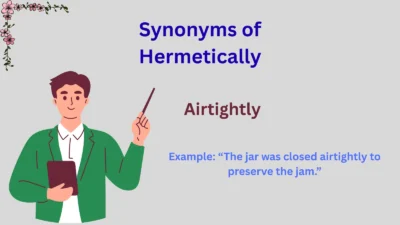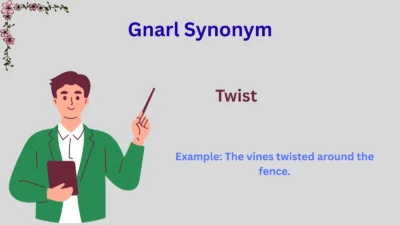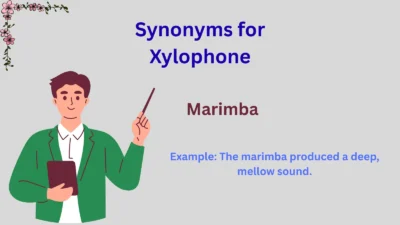Haunted house synonyms, such as spooky mansion, ghostly residence, and creepy dwelling, describe homes or buildings associated with fear, mystery, or supernatural activity. For example, a haunted house might be abandoned, dark, and filled with eerie sounds that send shivers down visitors’ spines.
Using the right synonym for haunted house helps you set the perfect mood — whether for horror stories, Halloween content, or paranormal tales. Each term emphasizes a unique aspect, from frightful suspense to ghostly intrigue.
If you’re writing about scary stories, festive Halloween decorations, or supernatural folklore, choosing precise synonyms for haunted house makes your descriptions vivid, immersive, and chilling. In this guide, we’ll explore alternatives, their meanings, and how to use them effectively.
What Does Haunted House Mean?
A haunted house is a building, often abandoned or old, that is believed to be inhabited by ghosts or supernatural entities. It is associated with fear, mystery, and eerie experiences, making it a popular theme in horror stories and folklore.
Haunted houses are often characterized by:
- Ghostly or supernatural activity that unsettles visitors
- Creepy or eerie settings like dark corridors, creaking floors, and shadowy rooms
- Suspense and fear are designed to thrill or scare people
- Abandoned or old architecture that adds to the spooky atmosphere
It’s not just about being old or dark — a haunted house combines environment, history, and imagination to create an unforgettable, spine-chilling experience.
30 Synonyms & Related Words for Synonyms of Haunted House
1. Ghost House
Description: A house believed to be visited by ghosts.
Example: “They dared to enter the old ghost house on the hill.”
Usage: Casual and widely understood; often used in storytelling or folklore.
2. Spooky House
Description: A house that gives a frightening or eerie feeling.
Example: “The kids loved trick-or-treating at the spooky house down the street.”
Usage: Informal; suitable for Halloween or lighthearted contexts.
3. Cursed House
Description: A house believed to carry a supernatural curse.
Example: “Legend says the cursed house has been abandoned for decades.”
Usage: Dramatic or literary; emphasizes supernatural danger.
4. Phantom House
Description: Implies the presence of ghosts or phantoms.
Example: “The old mansion looked like a phantom house in the fog.”
Usage: Poetic or literary; evokes mystery and suspense.
5. Possessed House
Description: A house believed to be controlled by spirits or demons.
Example: “Horror films often feature a possessed house with sinister activity.”
Usage: Dramatic and intense; strong supernatural tone.
6. Abandoned House
Description: A house empty or deserted, often creepy in appearance.
Example: “The abandoned house at the corner gave everyone chills.”
Usage: Neutral to slightly eerie; can imply neglect without overt supernatural claims.
7. Eerie House
Description: Creates an uncanny or unsettling feeling.
Example: “They approached the eerie house cautiously.”
Usage: Informal or descriptive; emphasizes atmosphere rather than ghosts.
8. Spook House
Description: Colloquial term for haunted house; used in amusement parks too.
Example: “We went through the spook house at the Halloween fair.”
Usage: Casual, playful; good for entertainment or kids’ contexts.
9. Haunted Mansion
Description: A large, haunted residence; more dramatic than “house.”
Example: “The haunted mansion on the cliff inspired local legends.”
Usage: Literary or storytelling; conveys grandeur and spookiness.
10. Creepy House
Description: A house that evokes fear or discomfort.
Example: “The creepy house down the lane was off-limits at night.”
Usage: Informal; widely understood and casual.
11. Ghostly Dwelling
Description: A dwelling with ghostly activity.
Example: “The villagers avoided the ghostly dwelling in the forest.”
Usage: Literary; emphasizes supernatural presence.
12. Forsaken House
Description: Abandoned and desolate, often with a foreboding aura.
Example: “The forsaken house seemed untouched for decades.”
Usage: Literary or dramatic; focuses on neglect and isolation.
13. Macabre House
Description: Associated with death, horror, or grim imagery.
Example: “The macabre house had skeletons in every window.”
Usage: Darkly artistic or literary; conveys horror vividly.
14. Spook Mansion
Description: Similar to haunted mansion; playful or informal.
Example: “The kids explored the spook mansion during Halloween.”
Usage: Informal; fun or casual scary tone.
15. Shadow House
Description: Evokes mystery or darkness; may imply ghostly presence.
Example: “A shadow house appeared at the edge of the moor.”
Usage: Literary, poetic; creates suspenseful imagery.
16. Haunted Homestead
Description: A haunted house in a rural or farm setting.
Example: “The haunted homestead had an abandoned barn nearby.”
Usage: Historical or rustic storytelling; evokes old-fashioned eeriness.
17. Haunted Cottage
Description: Smaller, often quaint house with supernatural activity.
Example: “The haunted cottage by the lake had strange lights at night.”
Usage: Cozy yet spooky; lighter, whimsical horror tone.
18. Terrifying House
Description: Emphasizes fear rather than ghosts.
Example: “It was a terrifying house with creaking floors and dark corners.”
Usage: Descriptive, informal; focuses on atmosphere.
19. Haunted Estate
Description: A large, often luxurious property with supernatural presence.
Example: “The haunted estate has inspired many ghost stories.”
Usage: Dramatic and literary; suitable for gothic horror.
20. Abandoned Manor
Description: Large empty house, evokes mystery and decay.
Example: “The abandoned manor seemed alive with whispers.”
Usage: Literary; emphasizes history and desolation.
21. Gothic House
Description: House with gothic architectural or atmospheric style, often eerie.
Example: “The gothic house on the hill looked perfect for a horror novel.”
Usage: Descriptive, literary; architectural + spooky connotation.
22. Phantom Mansion
Description: Suggests grand building inhabited by spirits.
Example: “They explored the phantom mansion cautiously.”
Usage: Literary or dramatic; emphasizes ghosts and grandeur.
23. Haunting House
Description: A house that evokes haunting experiences.
Example: “The haunting house left everyone uneasy long after they left.”
Usage: Poetic or descriptive; emphasizes effect rather than presence.
24. Shadowy Dwelling
Description: Dark, mysterious house; implies fear or ghosts.
Example: “The shadowy dwelling seemed abandoned but full of whispers.”
Usage: Literary; atmospheric description.
25. Spirit House
Description: House associated with spirits or ghosts.
Example: “Legend says the spirit house holds restless souls.”
Usage: Formal or folkloric; spiritual or cultural context.
26. Chilling House
Description: A house that produces fear or a chill in the air.
Example: “The chilling house had cobwebs and frozen windows.”
Usage: Informal, descriptive; works well in stories or Halloween guides.
27. Abandoned Shack
Description: Smaller, dilapidated dwelling evoking spookiness.
Example: “The abandoned shack in the woods was said to be haunted.”
Usage: Casual, rustic; less dramatic, more eerie or realistic.
28. Haunted Cabin
Description: Smaller, isolated dwelling with ghostly activity.
Example: “The haunted cabin in the mountains was avoided by hikers.”
Usage: Rural, suspenseful; works in horror or mystery storytelling.
29. Forsaken Manor
Description: Large, abandoned, eerie house with dark history.
Example: “The forsaken manor hides many untold stories.”
Usage: Literary, dramatic; evokes history, mystery, and fear.
30. Cursed Mansion
Description: Grand house with supernatural curse or legend.
Example: “The cursed mansion’s doors are never open after sunset.”
Usage: Dramatic; emphasizes danger and legend.
How to Choose the Right Synonym
- Casual/Halloween tone: Use spooky house, spook house, creepy house, haunted cabin.
- Literary/dramatic tone: Use forsaken manor, haunted mansion, phantom house, shadow house.
- Small, quaint dwellings: Use haunted cottage, haunted homestead, abandoned shack.
- Grand and ominous: Use haunted estate, cursed mansion, phantom mansion.
- Atmosphere-focused (fear over ghosts): Use chilling house, eerie house, terrifying house.
Context and audience matter. A children’s Halloween story benefits from playful terms like spooky house, whereas gothic horror calls for forsaken manor or cursed mansion.
Conclusion
Exploring haunted house synonyms helps you describe eerie, mysterious, and supernatural locations with precision. Words like spooky mansion, ghostly residence, creepy dwelling, and phantom home each highlight different aspects — from suspense and fear to ghostly intrigue.
Using the right synonym allows you to set the perfect mood in writing, whether for horror stories, Halloween content, or paranormal tales. These alternatives make your descriptions vivid, immersive, and chilling, bringing haunted locations to life for your readers.



